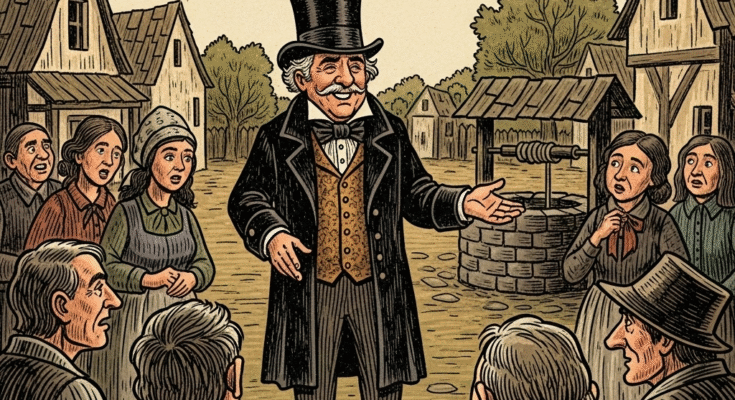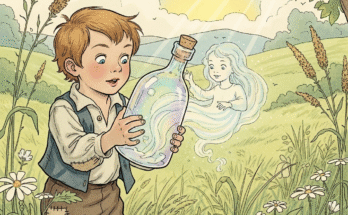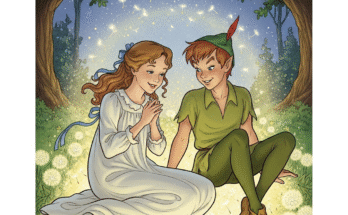Once upon a time, nestled between rolling hills and golden fields, there was a quiet little village where life was simple but not easy. In that village lived a poor yet clever farmer named Bert. He rose with the sun each day, tending to his small plot of land and caring for a few chickens and a rather stubborn cow. His hands were rough from work, and his boots worn thin, but his mind? His mind was always spinning with dreams—dreams of something more, something beyond the predictable rhythm of daily farm life.
Every evening, after the day’s chores were done, Bert would sit by the fire and stare into the flickering flames, wondering what else the world had to offer. More than anything, he longed for adventure and knowledge—something beyond planting seeds and fixing fences. He believed, deep in his heart, that there was more to life than plowing fields and repairing broken gates.
One chilly evening, as the village wind whispered through the shutters, Bert stopped by the local inn to warm himself with a mug of cider. At a nearby table, two travelers spoke in hushed voices about someone called Doctor Knowall—a man so wise he could solve any riddle, heal any wound, and uncover any secret. They said he was rich and famous, consulted by kings and queens, and beloved by all who met him.
Bert listened, eyes wide. A fire lit in his chest.
“If I were as wise as Doctor Knowall,” he thought, “I could help people… and maybe have some adventures of my own.”
That night, he made a decision. The next morning, he kissed his cow goodbye and sold her at the market. With the money, he bought a thick book bound in cracked leather, a long robe, and a tall, serious-looking hat—just like a real scholar. Then he painted a sign and hung it proudly outside his cottage:
Doctor Knowall – Wisdom and Help for All
At first, the villagers snickered. “That’s just Farmer Bert playing dress-up,” they said. But curiosity got the better of them, and soon enough, people started knocking on his door. Bert listened carefully, offered thoughtful words, and even flipped through his big book for good measure. Most of all, he paid attention—something few people truly did.
Some of the problems were simple: a lost goat, a sick hen, a quarrel between neighbors. But as time passed, Bert got better at finding solutions. Sometimes he used logic. Sometimes he guessed. And sometimes people simply needed someone who listened. Somehow, he actually helped.
As the weeks passed, Bert’s reputation grew. People who once laughed at him now stood outside his cottage, waiting their turn. He listened to tales of broken hearts, strange dreams, family arguments, and mysterious happenings in the woods. Bert never turned anyone away. With every visit, his confidence grew. He wasn’t just pretending anymore—he was learning, adapting, and genuinely making a difference.
One cloudy afternoon, a wealthy merchant in fine clothes arrived at Bert’s door. His face was pale, his eyes darting.
“Doctor Knowall,” the man said, wringing his hands, “a terrible crime has occurred. A golden box filled with jewels has been stolen from my home. The treasure is priceless. Can you find it?”
Bert, who had never solved anything more serious than a missing boot, felt a wave of panic. But he nodded solemnly and said, “Let me think. Stay for dinner while I consider your case.”
That evening, as the merchant sat at the table, Bert’s wife brought in a steaming pot of stew and set it down with a smile. Bert, lost in thought, muttered to her, “This will be the first bite.”
He meant the food.
But the merchant’s eyes went wide. He dropped his spoon.
“H-how did you know?” he stammered. “How did you know I was the first to take something from the box?”
Bert blinked. Did… did he just admit it?
Keeping a straight face, Bert leaned back in his chair and said in a deep voice, “There are many things I know, good sir. Return what you’ve taken, and we’ll leave it at that.”
The merchant, pale and shaking, confessed everything. He promised to return the treasure at once. And he did.
Word of Doctor Knowall’s genius spread like wildfire. People from nearby towns came to seek his help with their problems—some serious, some strange, and some just lonely hearts needing a listener.
Bert, to his surprise, had a knack for it. He used his common sense, his big book (which he now read every night), and more than anything, his ability to listen, to truly see people.
He was invited to mediate disputes between noblemen, help solve ancient riddles carved into the stones of old churches, and once even helped a shepherd find his entire flock, scattered after a thunderstorm. Each success brought new confidence, and with every challenge, Bert’s clever mind grew sharper.
Then one day, a royal carriage arrived.
The king himself had heard of Doctor Knowall and summoned him to the palace. It was a grand place—tall towers, glittering halls, and guards that looked like statues. Bert felt small beneath its ceilings, but he kept his head high.
“Doctor Knowall,” the king said, “for generations, my family has puzzled over a secret door deep within the palace. It has no keyhole, no handle, no clue at all. Can you unlock its mystery?”
Bert stood before the door. It was ancient, its surface carved with odd symbols that danced in the flickering torchlight. He paced the room, tracing the walls with his fingers. No one else had figured it out, not scholars or magicians or old palace keepers.
And then he saw it.
The carvings—they weren’t random. They formed a pattern, a story. Bert’s clever mind, sharpened by years of curiosity and fresh reading, pieced it together.
He touched the symbols in a certain order. There was a soft click.
The door creaked open.
Inside was a long-lost chamber, filled with ancient scrolls, strange devices, and golden artifacts that had not seen daylight in centuries. The king’s jaw dropped.
“Doctor Knowall,” he said, “you have done what no one else could. You are truly the wisest man in the land.”
From that day forward, Bert—once a poor farmer—was known not just for his cleverness, but for his heart. He never used his fame for greed. He traveled, helped the sick, solved disputes, and encouraged others to read, think, and believe in themselves.
He opened schools in villages, taught children to question and imagine, and reminded adults that wisdom could be found in the unlikeliest places. He sat with the lonely, spoke kindly to the outcast, and always made time for the smallest voice in the crowd.
He would often say, “A wise man doesn’t claim to know everything—he keeps learning, always.”
And so he did.
Years passed, and Bert—Doctor Knowall—grew old. But even in his final days, he welcomed visitors, shared stories, and listened with the same gentle attention he had given since the beginning.
One day, a child asked him, “Doctor Knowall, how did you get so wise?”
He smiled and said, “By being curious, by caring for others, and by never pretending to have all the answers.”
The child nodded, and Bert saw the same spark in their eyes that he had felt all those years ago by the inn’s fire.
Because even Doctor Knowall knew—there’s always more to learn.
The End.



